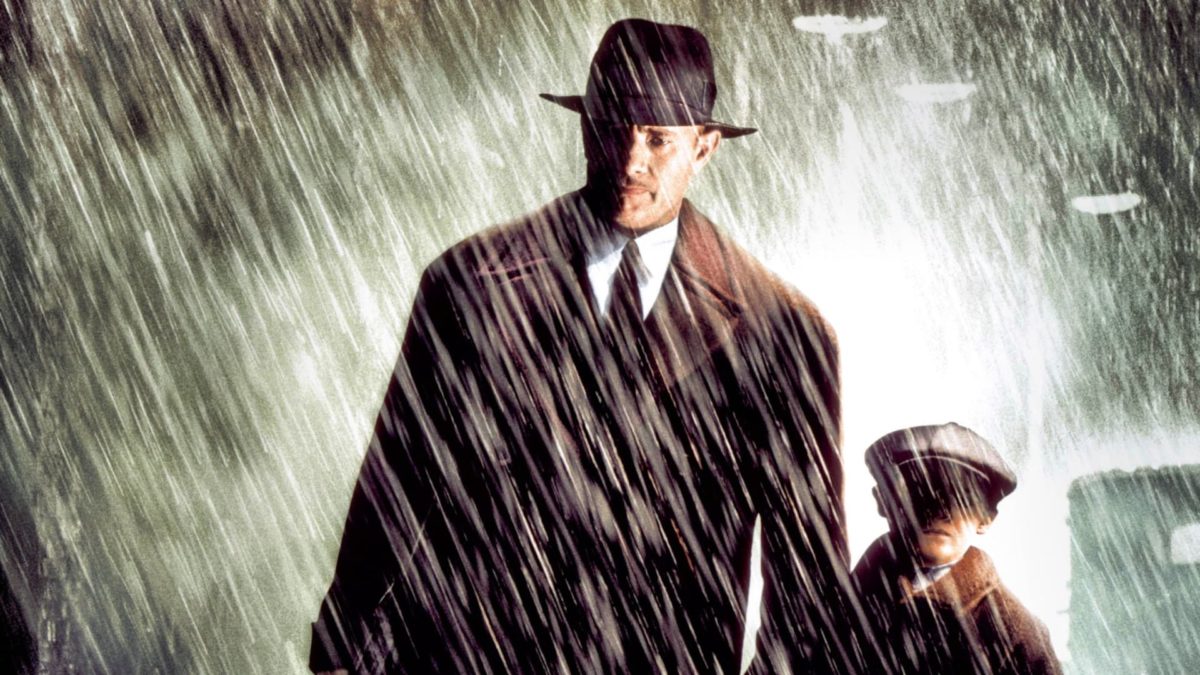Sometimes you don’t really have a concrete explanation. A movie just leaves you cold. That’s Road to Perdition to me. I can’t really objectively point to much that’s broken about it, but it just leaves me feeling frigid.
Sam Mendes’s second feature film, following the Oscar-winning American Beauty, is based off of a well-regarded graphic novel, and it shows. Once you see it, you can’t unsee it. Every shot is framed like a comic book panel. Mendes directs it quite well, but it’s directing on easy mode: he bought the story boards at Barnes and Noble, fully formed, for $14.99. I’m being somewhat facetious; I’m sure it took quite a bit of savvy and skill to translate the story into a cohesive whole. Lord knows the majority of graphic novel adaptations are mediocre at best. But the compositions are so meticulous, it almost feels anti-cinematic, like a Wes Anderson movie without the spark.
Tom Hanks stars as Michael Sullivan, a hitman for the mafia in 1931. One day, a hit goes bad, and his son, Michael, Jr. (tweenaged Tyler Hoechlin) witnesses the crime. Sullivan’s relationship with his boss and adoptive father, John Rooney (Paul Newman), crumbles in the ensuing paranoia, thanks in no small part to the hot-headed second-in-command, Connor Rooney (Daniel Craig), John’s son. It ends with Sullivan being chased by a creepy, psychopathic assassin-photographer (Jude Law) who captures on film the bodies he’s just killed. (The movie makes the expected “shots” vs. “shots” wordplay.)

The acting is all around quite good, with every member of the ensemble getting moments to shine. Newman doesn’t have all that much to do, but he’s completely engaged in one of his last roles. Law and Craig give perhaps the most distinctive turns as the villains of the story. And Hoechlin is no River Phoenix or Christian Bale, but he acquits himself quite well.
Oddly, Hanks, almost always a slam dunk for me, feels like he’s working too hard against his own instincts. Sullivan is a character who is emotionally reserved and guarded. Hanks claims to have fallen in love with the part when he read the script and fought to be cast as the lead, but it would have been better suited for someone whose presence is more intense and physically aggressive than the stereotypically congenial Hanks. He’s not at all bad in the role, and has a few great moments — predictably, when Sullivan lets his guard down and opens up. But overall, it’s a muted and forgettable performance of his.
What really shines is the cinematography. All-timer Conrad Hall, in his last gig, really brought the magic. This is an astoundingly beautiful film, especially in the lighting. A couple of scenes — an ambush in the rain, a shootout in a hotel — actually made me emit audible noises in reaction to the loveliness. (I had headphones on and my wife was confused why I was “oooh”ing.) Hall treats the material as a neo-noir with just the right amount of color. Everything shot in shadows at nighttime, in particular, is glorious.

I’m a little bit more medium on the film’s score by Thomas Newman. It’s a compelling piece in isolation, but it’s so overbearing throughout the film. Moments that could have built in gravity with silence are instead drowned out by climactic string refrains.
The writing itself is adequately interesting. The father-son themes are dolloped on very thick, which is usually a theme I adore, but something about it didn’t register here. It’s all so on-the-nose. Plenty of moments work, but I found it all cliched and woefully unchallenging. The heart-of-gold hitman is such an obvious stereotype, and the film doesn’t do much to push its outer boundary beyond giving him a son, and even then doesn’t do much with it.
Maybe I just caught Road to Perdition on the wrong day two times in a row, but my admiration for it outstrips my affection for it. It’s a solid enough crime drama, and its two hours fly by pretty quickly, but without much resonance.
Is It Good?
Good (5/8)
Dan is the founder and head critic of The Goods. Follow Dan on Letterboxd. Join the Discord for updates and discussion.


2 replies on “Road to Perdition (2002)”
Aw, too bad. This is like my no. 3, I think, Hanks movie. I really love the way it uses his persona, even as he actively fights against it and the character itself is so anti-Hanks in every respect beyond being the audience stand-in’s dad. Maybe it’s more interesting in a meta, mechanical way, but as you say, it looks awfully good, and I at least found it to be pretty emotional at bootom.
Does it help if I never read the comic book? It probably wouldn’t matter too much either way, but then, if I ever rated Watchmen I feel like I’d have to give it an N/A rather than an actual score because it really is just the freaking comic and freaking comic known for popularizing “cinematic” style in the sense of using a simulacrum of duration, etc. (It’s a formalist masterpiece of comics for other reasons beyond that and for reasons absolutely embedded in the page, but you know what I mean.) But even though I like the guy, I’d be readier to give Snyder more credit for 300 just because at least that isn’t determining editing rhythms and composition.
I’ve actually never read the comics either, although I feel like I have just from watching this. Watchmen definitely feels just as much, or more, a “graphic novel storyboarded straight to screen” as Road to Perdition even though it rewrites the whole alien squid element. Need to see 300 again